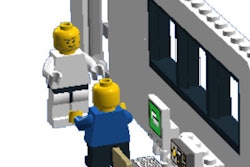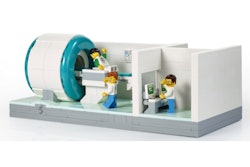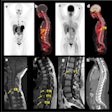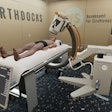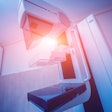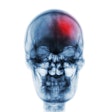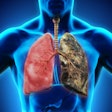Giving young children a playkit that uses both virtual and augmented reality appears to reduce anxiety about this procedure, U.K. researchers have reported in an article posted on 7 November by BMJ Innovations.
The "mixed realities" playkit is designed to help children prepare for the different elements of the MRI experience, using physical play to learn about an MRI scanner, augmented reality (AR) play to learn about the work of a radiographer, and virtual reality (VR) play to explore the journey of having an MRI scan.
"The development of the mixed realities MRI playkit addresses a significant global problem within paediatric anaesthesia and presents an opportunity for a change in practice to reduce the use of general anaesthetic and improve efficiency and resource usage within radiology and anaesthetic departments," noted first author Jill Thompson, PhD, a senior lecturer and qualitative health researcher at the University of Sheffield, adding that safety concerns remain about the potential impact of anesthesia on a child's developing brain.
In Sheffield, the longest waiting list in radiology is for MRI scans performed under general anaesthetic, and delays in performing scans lead to delays in diagnosis and treatment, as well as increased usage of scanning time, having a further impact on the MRI waiting list.
Convinced that play can reduce children's anxiety about medical treatment and procedures, the researchers developed a playkit to help 4- to 10-year-olds have an MRI scan without a general anaesthetic. They deliberately built it to require the help of an adult as parental anxiety can have a direct influence on a child.
How the playkit works
The playkit consists of a flat-packed cardboard kit for building into a small toy MRI scanner, into which the child can place their toy. A smartphone slotted into the side of the cardboard MRI scanner enables the child to take on the role of the radiographer, via an AR app.
AR superimposes a computer-generated image on a user's view of the real world. The child can then scan their toy with the addition of scanning noises to replicate the MRI exam. Afterward, the child can swipe through various aspects of the real MRI images the radiographer plans to take, the authors explained.
The kit also includes an age-appropriate virtual reality cardboard headset, which, along with the app, allows the child to walk through the hospital virtually, culminating in him/her entering the MRI scanner itself.
The walkthrough includes four interactive games to prepare the child for various aspects of their journey, such as checking in, being weighed, removing magnetic objects from clothing, and staying still for the scan itself.
The playkit was tested on 13 patients and their parents or carers, and the feedback was positive. The children said that recalling aspects of the playkit during their scan helped them to remain calm and still. Others said that the playkit helped prepare them for what an MRI scanner would look like and the noise it would make, according to Thompson and her colleagues.
Older children seemed to prefer the VR aspects of the kit, while younger children were more drawn to the physical play and AR aspects. Both children and parents/carers said that they had previously felt anxious about the prospect of an MRI scan because of the unknowns involved, and the children suggested that they would like to have detailed factual information about the MRI scan.
One child-parent pair found it difficult to build the mini cardboard scanner, so the design may need further refinement, and the playkit would need to be tested on much larger numbers of children both nationally and internationally, the authors stated.
They think the kit has the potential to be adapted for use elsewhere, such as to help prepare children coming into an admissions unit for planned surgery, during transfer to the operating room, and procedures involving needles.
The launch event for the playkit was held in Sheffield in October 2022. Further details on the project are available here. The playkit has also featured on the BBC TV show, Operation Ouch.
You can read the full BMJ article here.




